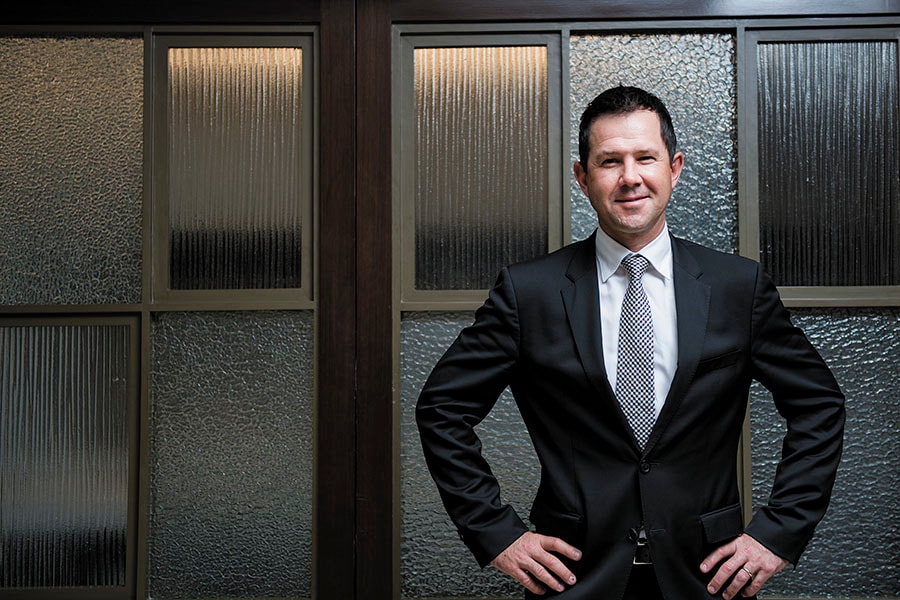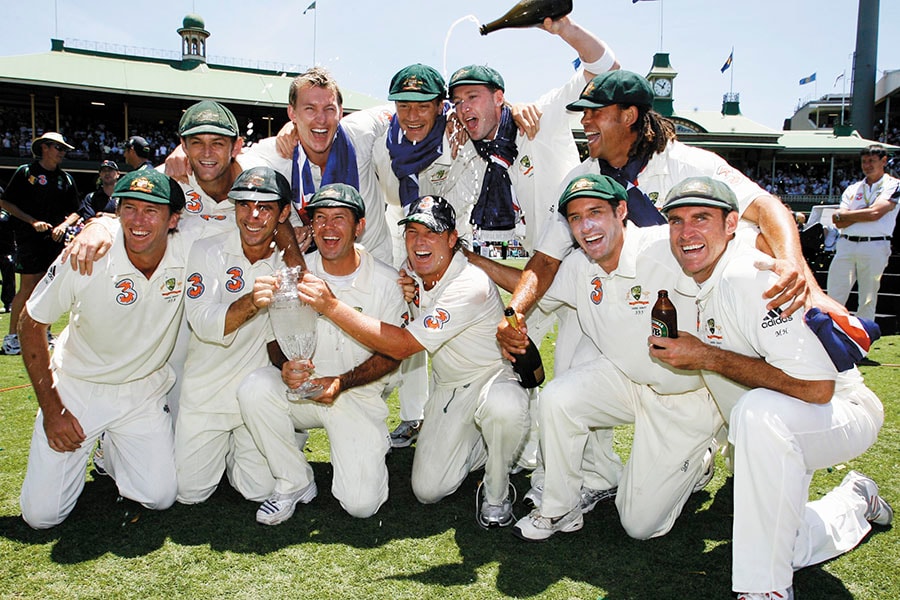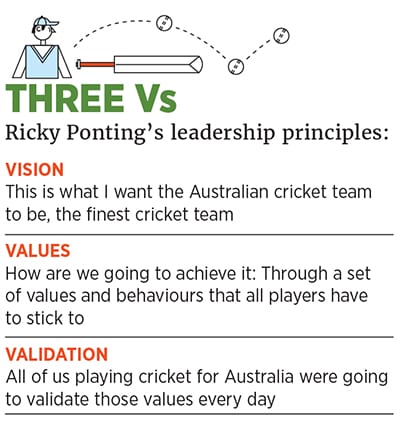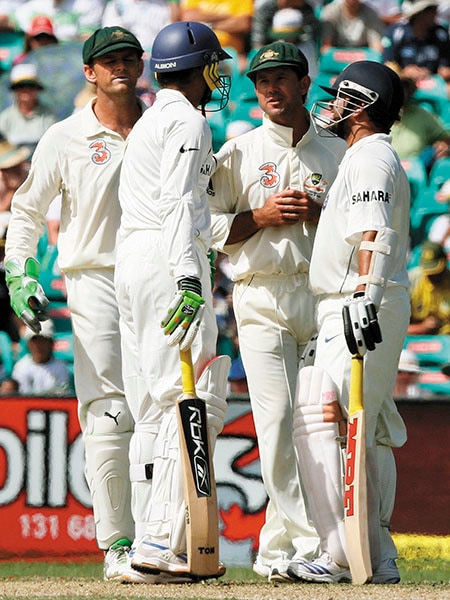
Cricket legend Ricky Ponting's leadership manual
What makes a good leader? Ricky Ponting, cricket's most successful captain, offers some answers

Image: Mexy Xavier
When Graeme and Lorraine Ponting figured out that their firstborn was quite good at cricket, they bundled him off to Mowbray, the local club in the middle-class locality of Launceston in Tasmania. Ricky Ponting was about 8 years old then, and rather unremarkable; he preferred listening to talking, and a quiet corner to the hubbub in the dressing room. One of Mowbray’s stalwart players, Brad Jones, recalls in Australian Story, a series on ABC TV, “If you didn’t look, you wouldn’t know he was there.”
What they also wouldn’t know was that when the seniors were out on the field, Ponting would trawl through their kitbags, slip into their gear, shadow with their bats and turn the dressing room into his private cricket pitch. Just before lunch, when it was time for the players to return, he would slide back into his cocoon, and put the gear exactly as he had found them, ensuring that the seniors didn’t know they had been messed with.
For many, Ponting’s actions were resonant with the impish streak the former Australian cricket captain became known for. His father Graeme remembers that when he was three, Ponting would sneak up on local kids returning from school, push them and scurry back indoors. His national teammates, like Adam Gilchrist and Justin Langer, will stand testimony to the numerous pranks he’s played on them.
But his fondness for stepping into the shoes of his seniors wasn’t mere mischief-making. It signalled an intent that was far too serious and ambitious for his pre-teen years: Of emulating and pitting himself not against his peers but those older and more skilful than him.
“My aspirations of playing grew from Mowbray to Tasmania and to Australia. The pursuit of improving and being consistently better pushed me towards people who were better than me,” the 41-year-old Ponting tells Forbes India. “Such a quest breeds leadership qualities within you because leadership is all about looking ahead. When I was young, I didn’t set out to become a leader. But it became a natural progression for me because I was always looking to be better.”
His bragging rights are well earned as Ponting is not only the most successful cricket captain for his country but also in the world. As skipper, his 220 wins in 324 matches across formats, with two consecutive World Cup wins (in 2003 and 2007 where the team was unbeaten through the tournament), puts him on top of an elite league and ahead of contemporaries like New Zealand’s Stephen Fleming, South Africa’s Graeme Smith and India’s Mahendra Singh Dhoni.

Image: David Gary / Reuters
His ability to see the big picture has helped Ponting transition into a coaching role with Indian Premier League (IPL) outfit Mumbai Indians (owned by Reliance Industries, which also owns Network 18, the publishers of Forbes India) post-retirement as well as mentor business leaders at the prestigious BSchool in Australia.
Recently in Mumbai, he launched an education programme that’ll allow business leaders from around the world, including India, to travel to his home state, Tasmania, and pick up the best of Australian leadership practices. “There are many parallels between sport and business. I sit in a lot of business meetings now and the things you talk about in those are similar to what I’ve discussed in an Australian cricket team meeting,” says Ponting. “It’s easy to move on a growth path. All you need is a vision, focus and communication.”
Team Comes First
As a cricketer growing up in Tasmania, Ponting found the inspiration to make it big in his neighbourhood. About 10 minutes from his home in Launceston lived David Boon, a portly man with a distinctive handlebar. Around the time Ponting was getting his feel of the game at Mowbray, Boon was a star in the Australian national side with his stubborn, defiant batting and his extraordinary agility at close-in fielding positions. The man whom captain Allan Border labelled his Rock of Gibraltar also provided young Ponting with a career path to follow. “If he can make it, why couldn’t I, I thought,” says Ponting.
Ponting had his first brush with his hero on the field during his teens, when he started playing for the state team, of which Boon was the captain. Tasmania, then, was one of the minnows in the Sheffield Shield, the domestic first-class tournament in Australia. In one such match, Boon declared the innings with Ponting stranded in the late 90s.
Cricket is replete with instances of controversial declarations. Rahul Dravid’s Multan declaration, for instance, that came six runs shy of a double hundred for Sachin Tendulkar and left the latter, and the entire country, fuming. Not Ponting, though. Boon’s declaration was Ponting’s baptism to Australian cricketing values that put the team ahead of personal glory. “I don’t regret the decision at all. I would have done the same thing if I was the captain. Because a captain’s job is to create a situation that gives the team the best chance to win,” says Ponting.
It’s this sentiment that shapes Ponting’s choice of the most abiding memory of his career. Not any personal milestone, but an image that goes back to the South Africa tour of 2009 with a young side that was trying to live up to the sparkling legacy of the likes of Matthew Hayden, Adam Gilchrist, Justin Langer, Glenn McGrath and Shane Warne.
Australia had won the first two Tests and sealed the three-match series against the then No 1 side. “After the second Test match at Durban, I deliberately walked 30-40 metres ahead of the new group and stood near the boundary line. I wanted to watch these young guys and see what it meant for them to beat the best Test side at that time. The sight of them huddling around, wrapping their arms around one another, filled my heart with warmth,” he says.
What about the consecutive World Cup victories as captain, or the unbeaten knock of 140 in the final of the 2003 World Cup? “I told you. The sport was never about me. It was always about the team.”
Lead By Example
Ponting inherited the team from Steve Waugh, who led Australia to 15 of the 16 consecutive Test victories between 1999 and 2001, and won the World Cup in 1999. Gritty and ruthless, Waugh consolidated Australia’s fairytale ascendancy that started with previous captains Allan Border and Mark Taylor. When Ponting was appointed the ODI skipper in 2002, during the tour of South Africa, he, clearly, had big boots to fill.
Besides, not only was he chosen ahead of other world-class players, he came with a history of drunken misdemeanours that sullied his public image. At the helm, Ponting had to put all of it behind and lead by example. In order to do that, he latched onto the words of wisdom that came from the man who was passing on the mantle of leadership to him.
“Steve had told me that if there was one mistake he made when he initially became the captain, it was to undermine his role as a player. He told me that when I went out to bat, I wasn’t the captain of the side but the No 3 batsman with the responsibility of scoring runs, just like any other batsman. It was a gem of an advice,” says Ponting, who did one better than Waugh by leading Australia to 16 consecutive Test wins between 2005 and 2008.
 It was exactly the kind of captain that Waugh himself was: Competitive, intense, and expecting nothing less of his team. “It’s no coincidence that Steve, when he was the captain, was one of the few players to average over 50. Then, a few years into his captaincy, there were guys like Hayden, Damien Martyn, me and Gilchrist who were averaging above 50 in Tests. We were all chasing his example,” says Ponting. His status as Australia’s highest run-getter in Tests and ODIs with over 13,000 runs in both formats (and second only to Tendulkar on the overall list) stands testimony to his batting proficiency as well.
It was exactly the kind of captain that Waugh himself was: Competitive, intense, and expecting nothing less of his team. “It’s no coincidence that Steve, when he was the captain, was one of the few players to average over 50. Then, a few years into his captaincy, there were guys like Hayden, Damien Martyn, me and Gilchrist who were averaging above 50 in Tests. We were all chasing his example,” says Ponting. His status as Australia’s highest run-getter in Tests and ODIs with over 13,000 runs in both formats (and second only to Tendulkar on the overall list) stands testimony to his batting proficiency as well. His stellar performance in the 2006-07 Ashes series, where Australia whitewashed England, would be another example of how Ponting led a turnaround from the front. The previous series, in 2005, was a blemish on the Aussie captain’s career not only in the way the team lost the series despite winning the first Test, but also because of the few expletives he was seen spouting at English coach Duncan Fletcher after being run out in the fourth match in Nottingham. A livid Ponting complained that Gary Pratt, the man who ran him out, was sent on the field as a substitute fielder to let the weary fast bowlers rest, a practice that was against the spirit of the game. The meltdown cost him 75 percent of his match fees and the team the series.
Ponting admits that his biggest challenge on the field was that he became “too animated when things were unjust” and that he just couldn’t accept things that were “bad by the game”. But he got his wits together soon enough to plot a revenge, right from the time the last ball in the forgettable 2005 series was bowled. In 2006-07, he executed the plan to perfection, and this time with mere on-field heroics: With two centuries and as many half centuries in five matches, Ponting avenged the defeat as well as took home the Man of the Series award.
Fair And Equal
In the first few years of Ponting’s captaincy, Australia had a string of gifted players who made the team indomitable in all formats of the game. While that made Ponting’s job on the field easy, it also meant that he had to straddle multiple egos off it. How do you handle a galaxy of stars in your team? Simple, says Ponting: By not treating them as stars. “They were just teammates to me. Ego is good as long as it provides you with the confidence to compete at an international level. Beyond that, it’s not welcome in my team.”
Besides, a team sport plucks individuals out from disparate settings and throws them together with a common goal. And the onerous task of putting divergent units into one whole, to get them to commit to a shared value, lies with the captain.
As Ponting says, “Quite often, I would go into a Test match with guys I didn’t know. As a captain, you’ve got to give yourself to them and let them know that you are part of the same team.”
For Ponting, international trips were the best opportunity for team building. Touring in Australia was hectic and the setting all too familiar; being together in an alien land helped them open up to one another and build camaraderie over lunch, coffee or just by being with each other. “The important thing is to spend time with young guys, make sure they don’t feel left out; find out what motivates them, how they deal with wins and losses,” he says.
Such even-handedness came forth on the eve of the team’s first match in the 2003 World Cup, against Pakistan, when news broke that Shane Warne, one of the world’s best spinners, was being sent home after testing positive for a banned substance. Ponting wasn’t evasive in dealing with the setback or covering up for his old buddy; instead he asked Warne to face the team. “I told Warney that, mate, this is your problem, so you are telling the boys. You are going to sit there and answer the questions they have,” says Ponting. “The boys need to clear all the confusion and start on a fresh note.” The long evening session that followed ensured that Australia regrouped fast, walloped Pakistan, stayed unbeaten through the tournament and won it for the second consecutive time. “The way we handled the situation was probably my proudest moment as captain,” adds Ponting.

Image: Greg Wood / AFP / Getty Images
The Dirty Job
Not all fires, though, are doused so easily. The Sydney Test against India in January 2008, for instance, was a match that came to be notorious for the Monkeygate scandal. An on-field altercation between Andrew Symonds and Harbhajan Singh flared up off the field as well, with Symonds alleging racial abuse (of being called a monkey) and Ponting reporting it to the match referee. The Aussie captain was lambasted for his action by some who said it had breached the spirit of the game.
While he admits that he propagated aggressive captaincy, Ponting refuses to equate an aggressor with an instigator. “I don’t think things get nasty as such, just that the body language looks a little more aggressive than what it actually is. Yes, Australians do push the line sometimes. But whenever they’ve overstepped, it’s only because emotions got the better of them. And there aren’t too many international cricketers who haven’t made similar mistakes,” he says.
The success of the Ponting brand of captaincy perhaps lies in the way the Indian team has adopted it over the past decade or so. “Look at the current Indian team and you’ll see the definitive swing towards aggressive play as well,” argues Ponting. India’s Test captain Virat Kohli has been marked out not just for being a world-class player but also for his Aussie-like ruthlessness and refusal to yield an inch on the field. Consider his strategy to play five specialist bowlers in Tests, abrogating India’s safety-first approach and pushing for a victory instead of a tame draw.
That’s not a bad legacy to have, particularly for Ponting, who never set out to be a leader in the first place.
(This story appears in the 30 November, -0001 issue of Forbes India. To visit our Archives, click here.)
X





